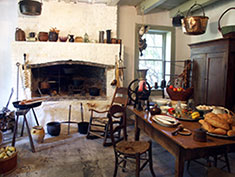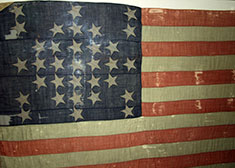Northeastern South Carolina History Eras and Time Periods
Early National Period
The delegates from South Carolina were instrumental in the crafting of the U.S. Constitution, and South Carolina was the eighth state to ratify the founding document. In the opening decades of the 19th century, South Carolina was prosperous and politically influential.

An example of what a colonial plantation kitchen
would have looked like in the early 1800s.

The Union flag that flew over Ft. Sumter in
Charleston harbor.
Your Search For: Era/Period- Early National Period
Returned 39 records |
|
3560 Kings River Road, Pawleys Island, SC 29576, 843-237-4223 [View Map]
Overview
One of the oldest existing churches in South Carolina, All Saints Episcopal Church was established in the 1730s, and served as a spiritual and culture center for South Carolina's proposerous rice-planting community until after the Civil War.
|
|
Downtown, Bennettsville, SC [View Map]
Overview
Encompassing much of downtown Bennettsville, the Bennettsville Historic District includes historic homes, churches and public buildings. Among them is the Marlboro County Historic Museum and a historic home that was commandeered by Northern troops during the Civil War.
|
|
1235 Long Point Road, Mt. Pleasant, SC 29464, 843-884-4371 [View Map]
Overview
Boone Hall Plantation and Gardens is a restored plantation from the Colonial and Antebellum periods of South Carolina history. Although the manor house is modern, the brick slave cottages date from the time when Boone Hall was a working rice plantation.
|
|
414 North Main Street, Hemingway, SC, SC, 843-558-2355 [View Map]
Overview
A farm museum featuring a 19th century farmhouse and related structures, the Browntown Museum depicts period life on a small farm in the Pee Dee Region.
|
|
three miles from U.S. 701 on Old Bucksville Road, Busksport, SC [View Map]
Overview
A towering riverside chimney is the sole reminder of a booming empire of timber and naval stores established here by a Northern timberman, Henry L. Buck, in the first half of the 19th century.
|
|
360 Meeting Street, Charleston, SC 29403, Phone 843-722-2996 [View Map]
Overview
The oldest museum in the United States, the Charleston Museum was established in 1773. Its numerous exhibits, displays and artifacts survey South Carolina's rich history and culture.
|
|
22 Hobcaw Road, Georgetown, SC 29440 [View Map]
Overview
Located on the southern tip of Waccamaw Neck, north of Georgetown, Clifton Plantation was one of the most spectacular plantations of South Carolina's coastal rice empire. It was the home of William Alston.
|
|
229 Main Street, Conway, SC 29526, 843-248-1760 [View Map]
Overview
Designed by the architect of the Washington Monument, the historic Conway City Hall building was built in 1825 as the Horry County Courthouse. Today, it is the central landmark for the historic river town of Conway which is one of the oldest towns in South Carolina. The picturesque Conway Riverwalk enables visitors to stroll alongside one of South Carolina's most scenic black-water rivers.
|
|
D.D. McColl House
Click to view entry for Bennettsville Historic District for more information 300 Main Street, Bennettsville, SC [View Map]
|
|
1 Public Square, Darlington, SC 29532 [View Map]
Overview
The city of Darlington is the county seat of Darlington County, which developed from a Colonial land grant settled in the 1730s by Welsh colonists from Delaware and Pennsylvania. A circuit court was established here in 1800, and a succession of courthouses have existed on this site. The modern Darlington County Courthouse was completed in 1964.
|
|
901 Highmarket Street, Georgetown, SC 29440, 843-546-5647 [View Map]
Overview
Home to one of the oldest Methodist congregations in the United States, Duncan Memorial United Methodist Church was established in 1785, following a visit by the famed Methodist evangelist Bishop Francis Asbury.
|
|
Highway 38, Latta, SC
Overview
Located adjacent to S.C. Highway 38, near Interstate 95 Exit 181A, near the town of Latta, the Early Cotton Press may be the oldest, original cotton press in the United States. While on private property, it may be viewed from a highway pullout.
|
|
Irby St., Florence, SC [View Map]
Overview
The Florence Railroad Museum, which is located on Irby Street beside the Florence City-County Government Complex, is housed in a restored railroad boxcar. The Museum features exhibits and artifacts related to the history of the railroad in Florence.
|
|
360 Concord Street, Suite 201, Charleston, SC, 843-883-3123 [View Map]
Overview
The historic site where the American Civil War began, Fort Sumter is located on a small island in Charleston harbor and may be reached only by boat (the map link is for the ferry from the Charleston waterfront). Nearby Fort Moultrie on Sullivan's Island is part of Fort Sumter National Historic Monument and is the Revolutionary War site where South Carolina earned its name as the Palmetto State.
|
|
Front Street, Georgetown, SC 29440 [View Map]
Overview
The third-oldest city in South Carolina, Georgetown is rich in history and culture, and offers visitors a wide variety of historic attractions from the Colonial Era to the present.
|
|
637 Front Street, Georgetown, SC 29442, 843-546-7423 [View Map]
Overview
Located on historic Front Street in Georgetown, the Georgetown Rice Museum and the adjacent historic Kaminski Hardware Building present the history of the Georgetown-region rice empire.
|
|
1950 Rutledge Rd., McClellanville, SC 29458, 843-5469361 [View Map]
Overview
Maintained by the S.C. Department of Parks, Recreation and Tourism, Hampton Plantation State Historic Site preserves a Colonial-era rice and indigo plantation on the Santee River delta, approximately 16 miles south of Georgetown.
|
|
U.S. 301/76 at Wallace Woods Road, Florence, SC [View Map]
Overview
Located at U.S. 301/76 at Wallace Woods Road on the campus of Francis Marion University, the Hewn-Timber Cabins consist of two slave cabins from a 19th century cotton plantation located on the site of Francis Marion University. The cabins were constructed by slave craftsmen about 1836, feature displays and artifacts, and are open to the public.
|
Page 1 of 3